If you want a van with an auto gearbox, there's more choice than ever. As well as conventional diesel vans for sale with an automatic box, the expansion of the electric van market has added more models that don't require the driver to change gear themselves.
If you want to buy a diesel van with an auto, then you're going to have to pay a bit more for it. Autos are usually only offered at the top of the van range, either with a powerful engine or in a high-spec trim level - fleet buyers looking to run auto-equipped vans will need deep pockets. It’s the same story if you want to switch to electric or plug-in hybrid power, because those vans are pretty expensive, too.
- SEE MORE Best medium panel vans to buy 2020
As well as paying more for an automatic van in the first place, you'll also be paying more at the pumps. The nature of an automatic transmission means it's not quite as efficient as a manual, based on official fuel consumption figures. Of course, your MPG will vary depending on your driving and payload, but if you compare a manual with an auto on the same route, the manual will probably be more efficient. If you're looking at the bottom line, then you'll need to weigh up whether the added ease of use that an auto gearbox offers outweighs its extra costs.
Most diesel auto vans come with a conventional torque converter automatic. This has benefits because the system - which uses fluid to transfer power from the engine to the wheels - is designed to cope with large power outputs, as well as big payloads.
Some vans - usually at the smaller end of the market - feature twin-clutch autos, which use clutch packs to pre-select gears. This kind of gearbox is faster to respond than a torque converter auto, although the reason it's commonly found on small vans is so that it doesn't have to cope with a heavy payload. The stresses that come with heavy loads in larger vans could cause excessive wear to the gearbox.
Electric and plug-in hybrid vans forego any kind of conventional gearbox and replace it with direct drive. Because these vans are powered by an electric motor, with instant torque available from zero revs, they don't need conventional gears to get power to the front wheels. This also means that they are quick to respond, and you won't find any hesitation in acceleration from one of these models - simply select drive, release the handbrake (although this usually releases automatically) and you're away.
So which automatic vans would we choose? Here are 10 of our favourites.
The best automatic vans on sale
Mercedes Vito
If you want a great automatic van, then who better to provide one than a manufacturer of great automatic cars? Mercedes has a long history of being good at making auto boxes, and the company uses the same transmissions on its vans as it does on its cars.
The most recent update to the Vito saw the arrival of Mercedes' 9G-Tronic nine-speed auto, which is taken straight from the passenger car range. It's a torque converter unit, and it offers smooth changes that mean it never feels like you're in the wrong gear.
The Vito is pretty unique in the sector, because the auto gearbox is more common than the manual through the range. If you choose a rear-wheel-drive Vito, then you get the auto box as standard, while the front-wheel-drive van is manual-only. What's more, you can only get the manual in basic Progressive trim, making the auto the default choice on higher spec Premium and Sport Crew Van variants.
What's more, the all-electric eVito is also available, with direct drive, offering a gearchange-free experience. It uses the same column-mounted shifter as the diesel van, so it's just as easy to drive, and the single-speed transmission means it's even more responsive than the standard auto.
Click here for our in-depth review of the Mercedes Vito...
Mercedes Sprinter
As with the medium-sized Vito, the larger Sprinter also benefits from Mercedes' passenger car expertise when it comes to auto gearboxes. The same 9G-Tronic nine-speed auto is available, while some selected Euro VI engines are available with the slightly older 7G-Tronic seven-speed auto. Whichever version you choose, both gearboxes are smooth shifters that will be able to cope with life in a heavy-hauling van.
Unlike in the Vito, these auto gearboxes are offered as an optional extra across the Sprinter range. However, that does mean that even the most efficient front-wheel-drive Sprinter can be had with an auto. This model gets the 9-speed box, and this same box is offered on all Euro 6d engines. If you're looking at a van that complies with Euro VI, then you get the 7-speed auto.
And just like the eVito, the all-electric eSprinter is available for zero-emissions driving and comes with a drive selector instead of a gearbox.
As ever, the Sprinter range offers you a broad variety of options in terms of panel van lengths and heights, conversions and just about any other configuration you can think of. And thanks to the fact that the auto box is an option, you can specify an automatic van that perfectly suits your requirements.
Click here for our in-depth review of the Mercedes Sprinter
LEVC VN5
In the medium-sized panel van sector, the plug-in hybrid LEVC VN5 offers a driving experience that really takes the stress out of life at the wheel. While some plug-in models switch from engine to electric motor to drive the wheels, the VN5 is a range-extending plug-in. That means it's only the electric motor that sends power to the wheels (the rears in this instance), while the three-cylinder petrol engine simply acts as a generator to provide power to the electric motor when it's needed.
This system is fully automated and doesn't require any driver input, save for selecting whether you want the van to manage energy use, store the battery charge for later or run in all-electric mode with no intervention from the engine.
Thanks to this range-extending set-up, it means the electric motor powers the van, and like all EVs, that means a conventional gearbox of any description isn't needed. The result is a van with instant acceleration and smooth drive all the way to the national limit without the need to take your hands off the steering wheel. Another benefit is that the rear-wheel-drive layout means there's a tighter turning circle than you'll find in any other medium-sized van.
The LEVC VN5 not only helps take the strain out of changing gears. Depending on which model you go for, there's a suite of safety kit to keep you on the road, with lane assist, adaptive cruise control and automatic emergency braking all on offer.
Click here for our in-depth review of the LEVC VN5...
Vauxhall Vivaro-e
Here's proof that you don't need to worry about range if you're thinking about buying an electric van, and it's a van that will take the strain out of everyday driving, too. The Vivaro-e (as well as its Citroen e-Dispatch and Peugeot e-Expert siblings) has an all-electric drivetrain, so the direct-drive format you get from any electric vehicle is present here.
Simply flick the neat-looking toggle switch into 'D' for drive, and you're away, with no gears to fumble around with. There are additional switches that let you choose more efficient or more powerful driving modes and the drive selector also lets you choose a 'B' mode to offer greater energy recovery when slowing down.
On the move, the Vivaro-e is a good performer. It sprints quickly off the line thanks to its direct drive, and there's enough power there to keep pace with traffic. There's also no real drop in performance when you've got a big load on board, although of course this will affect the van's driving range. That range? Well, you have 144 miles if you choose the 50kWh battery, or 205 miles with the 75kWh pack. Either way, the Vivaro-e offers the longest range of any electric van, and it's reasonably priced, too.
Click here for our in-depth review of the Vauxhall Vivaro-e
Citroen Dispatch
If you're not quite ready to make the jump to an electric Vivaro/Dispatch/Expert, the auto-equipped diesels are among the best for sale in the medium-sized panel van market. Like Mercedes, the PSA Group vans count on the passenger car range for their self-shifting tech. In this instance, the gearbox offered is the EAT8 automatic that is also found in cars such as the Peugeot 3008 and Citroen C5 Aircross.
Aside from a handful of exceptions, the EAT8 auto comes with the most powerful diesel in the range, the BlueHDi 180, and it’s the only gearbox available with this engine. It's also only offered in top-specs (Driver for the Dispatch, Elite for the Vivaro and Asphalt for the Expert), so prices start relatively high. Citroen and Vauxhall do offer the EAT8 with the BlueHDi 120 diesel, although in the Citroen it's only in the Crew Van body.
The auto-equipped vans get a neat-looking rotary gear selector in place of the manual shifter - simply turn this to the correct mode, and you're off. The shifts are smooth, although there is a slight hesitation when you demand rapid acceleration. The PSA vans aren't as badly affected by this hesitancy as some rivals, and while they aren't quite as spacious as some, if you need a diesel van that's easy to drive, then they are a better option.
Click here for our in-depth review of the Citroen Dispatch
Renault Kangoo ZE
Yet again, here's an electric van showing the way for self-shifters, this time in the small van sector. Admittedly there's a more limited choice in this market if you want an automatic gearbox, with the majority of vans featuring manual gearboxes to help keep costs down.
If you're in the market for a small van, then it's highly likely that you'll only be using it for short, local journeys, so why not look into driving an electric van? The Kangoo ZE won't win any beauty contests, but under the skin it features the same running gear as found in the Zoe supermini. That means it has a decent range of up to 160 miles. Even better is the fact that direct drive means you have instant acceleration without the need to row the gears.
The rest of the package isn't quite at the top of the small van class, because it's been around for a few years now. But if you want an automatic small van and can live with an electric model, it's the one we'd choose.
Click here for our in-depth review of the Renault Kangoo ZE
Ford Transit Custom PHEV
Another electrified van - you can see the theme here - and the Transit Custom PHEV is a more enjoyable automatic van to drive than any of the Powershift-equipped diesel Transit Customs. Like the LEVC VN5, the fact the petrol engine just acts as a generator means it's the electric motor that turns the front wheels, and that direct drive eliminates the need for a conventional automatic box.
This direct drive means there's instant acceleration, and unlike the Powershift auto, there's no hesitation in its delivery. Even when the petrol engine kicks in, there's still instant response, although it is accompanied by a bit of a drone from the three-cylinder EcoBoost unit.
You'll be able to travel around 30 miles on electric power before the engine kicks in, though, and the addition of the electric running gear doesn't have a negative impact on the Transit Custom's cargo volume (payload weights are down slightly, though).
If you need a diesel auto, then the Powershift is reasonable, but we think Mercedes is still the master when it comes to mid-sized automatic vans.
Click here for our in-depth review of the Ford Custom
Volkswagen Crafter
While the Mercedes Sprinter allows you to add an auto box to any van, the VW Crafter only has a handful of auto gearbox options available. You can have it with the 140PS or 177PS versions of VW's strong 2.0-litre TDI diesel, but VW also offers the option of 4MOTION four-wheel drive with the latter.
The gearbox is a decent shifter, and is an 8-speed unit to help promote efficiency. Fortunately, you can spec it in any van layout (there are three lengths and three roof heights offered), while that four-wheel-drive option adds another dimension to your van choices. The auto is offered in Startline and Trendline trims, with the lower spec helping to keep costs in check.
Interestingly, this is one van that benefits from having an auto box in terms of fuel consumption. The figures for the auto-equipped vans are marginally better, although you will have to do a lot of miles to recoup the additional outlay of having the auto box in the first place.
Click here for our in-depth review of the Volkswagen Crafter
Toyota Land Cruiser Commercial
Something of an alternative choice here, but not one that's without merit. The Land Cruiser Commercial is a great work machine, with the kind of off-road ability that conventional vans can only dream of, and much better comfort, too. Sure, you can't carry as heavy a payload as a pick-up truck, and it's a strict two-seater, but the Land Cruiser Commercial is well worth seeking out.
The standard Utility model - the one with steel wheels - has a six-speed manual box, but if you upgrade to Active spec, then not only do you get alloy wheels, climate control and touchscreen infotainment with Apple CarPlay and Android Auto, but you also get a torque converter auto gearbox. Of course, this is the same one you'll find in the standard Land Cruiser SUV, so it also comes with a suite of off-road friendly settings for the traction control. That means hill start assist and hill descent control are added as well, giving the Land Cruiser Commercial even greater off-road ability.
There is a slight penalty to pay in terms of fuel economy and payload weights when compared to the manual version, but you still get the option of short or long wheelbase variants, and one of the most unique 'vans' on the market.
Click here for our in-depth review of the Toyota Land Cruiser
Volkswagen Abt e-Transporter
Here's another van that proves electric drive is a more user-friendly alternative to an auto-equipped diesel when it comes to ease of use. Like the Vauxhall Vivaro-e and Mercedes eVito, the VW Abt e-Transporter has a direct-drive system that replaces the diesel-auto system in the standard Transporter. The diesel van's gearbox is a bit of a ponderous performer, with slow responses at low speed and lots of slip as the gearbox manages power delivery to the front wheels.
This is all eliminated in the Abt e-Transporter. Simply put the gear selector into Drive, and as soon as you press the accelerator, there's a surge from the electric motor and you're on your way. It means the Transporter is quick from a standstill, and it's more refined than the standard van when at a cruise, too.
Of course, you'll have to be certain that electric drive fits into your everyday van use, and that the Abt e-Transporter's range of 82 miles on a full charge is suitable for your needs. But not many electric vans feel as upmarket as VW's offering.
Click here for more on the Volkswagen Abt Transporter
from Sitewide RSS feed https://bit.ly/3p2HkQX

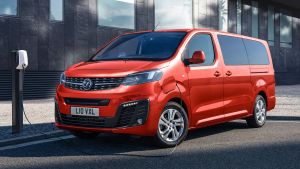
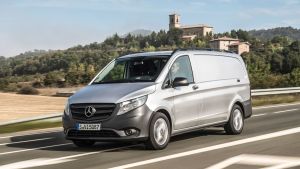
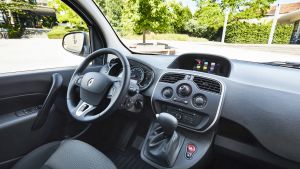
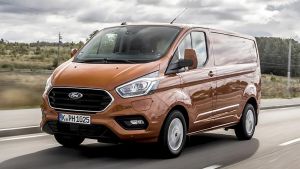
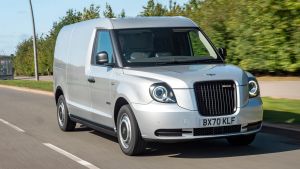
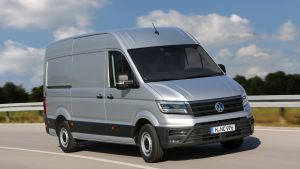
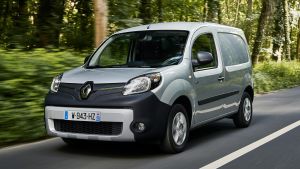
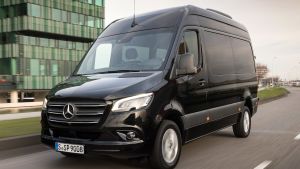
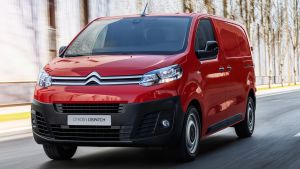
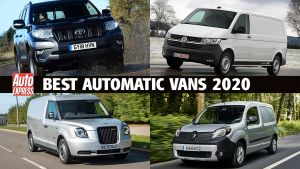
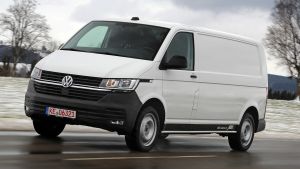
Comments
Post a Comment